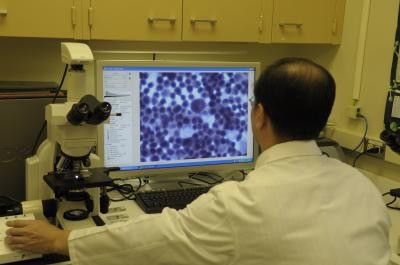Movember: Red Wine Helps Fight Against Prostate Cancer

As the mid-way point of Movember approaches, scientists have found that red wine and grapes help in the fight against prostate cancer.
Researchers from the University of Missouri have found that a compound in grape skins and red wine makes prostate tumour cells more susceptible to radiation treatment.
They also found the compound, named resveratrol, had beneficial effects on cardiovascular health and stroke prevention.
Michael Nicholl, an assistant professor of surgical oncology in the MU School of Medicine, said: "Other studies have noted that resveratrol made tumour cells more susceptible to chemotherapy, and we wanted to see if it had the same effect for radiation therapy
"We found that when exposed to the compound, the tumour cells were more susceptible to radiation treatment, but that the effect was greater than just treating with both compounds separately."
As well as being present in red wine and grape skins, resveratrol is also available in many shops. However, the dose needed for it to have an effect on tumour cells is very high, so men would be likely to suffer from side effects if they tried to use in in conjunction with radiation therapy.
"We don't need a large dose at the site of the tumour, but the body processes this compound so efficiently that a person needs to ingest a lot of resveratrol to make sure enough of it ends up at the tumour site," Nicholl said.
"Because of that challenge, we have to look at different delivery methods for this compound to be effective."
Prostate cancer cells contain low levels of proteins perforin and granzyme B, which can work together to kill cells. In his study, Nicholl introduced the compound into the prostate tumour cells and the protein activity increased significantly - so much so that 97 per cent of the tumour cells died.
Nicholl said: "It is critical that both proteins, perforin and granzyme B, are present in order to kill the tumour cells, and we found that the resveratrol helped to increase their activity in prostate tumour cells.
"Following the resveratrol-radiation treatment, we realised that we were able to kill many more tumour cells when compared with treating the tumour with radiation alone. It's important to note that this killed all types of prostate tumour cells, including aggressive tumour cells."
Nicholl is now looking to test the procedure on animals before clinical trials can be started. If future studies are successful over the next few years, researchers may be able to develop a new treatment for cancer.
This study follows research by the Medical Research Council, which found that turning on key genes inside cells in prostate tumours can help to slow the growth of the disease. Findings showed that turning on these 'fibroblast' cells dramatically reduced the size of prostate tumours grown in mice.
Dr Axel Thomson, lead researcher, said: "This is an extremely exciting development that has the potential to form the basis of a revolution in prostate cancer treatments over time if replicated in humans.
"By targeting the fibroblasts that control the growth of the cancer these new treatments could be both more effective and likely to lead to significantly fewer side effects."
© Copyright IBTimes 2025. All rights reserved.




















